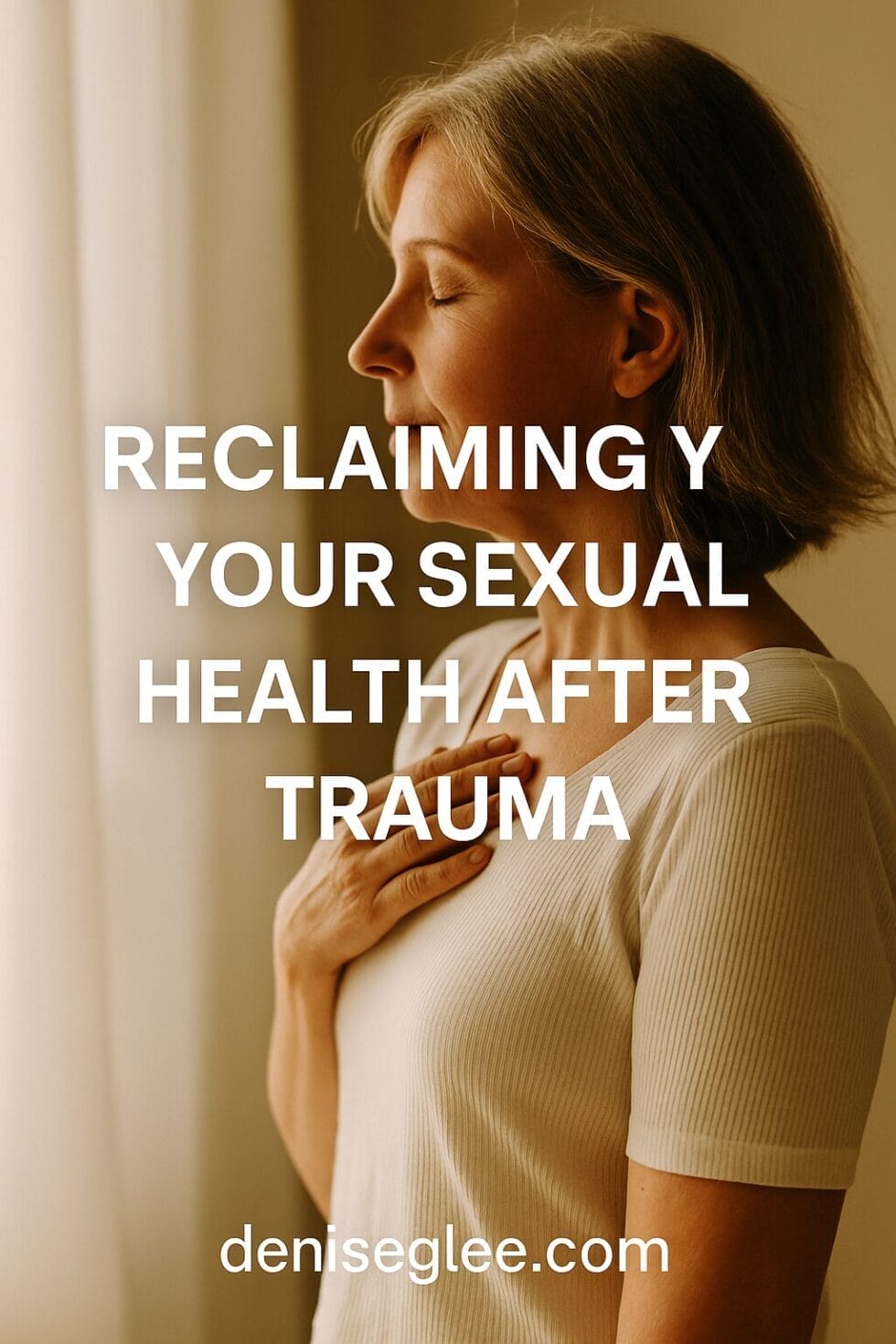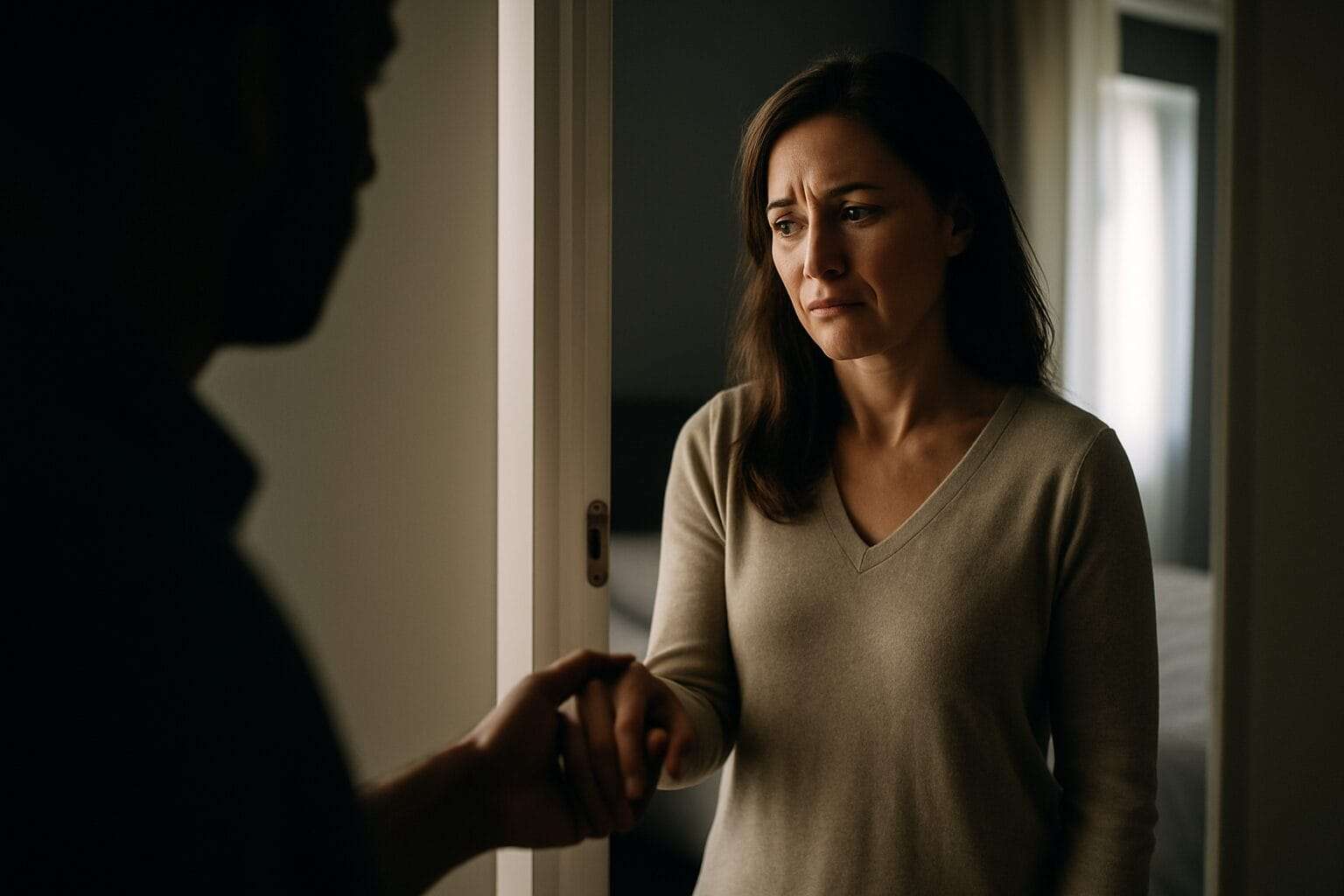
Reclaiming Your Sexual Health After Trauma
- Updated: May 19, 2025
There comes a point—usually after years of pretending everything’s fine—when you stop avoiding the truth.
You realize it’s not “just hormones.”
It’s not “just aging.”
It’s not because you’re “not in the mood.”
It’s because your body has been carrying stories your mind never got to finish.
I’ve worked with women who would rather lead a company than be touched. Women who freeze up in bed with partners they love. Women in their 40s, 50s, and 60s who say things like,
“I thought I’d just go travel, watch my grandkids, maybe enjoy a glass of wine. But… I want more. I want to feel again.”
If that’s you—this post is your now what.
We’re going to talk about how past sexual trauma can affect your sexual health, your relationships, and even your confidence. Not to scare you. Not to diagnose you.
But to help you understand:
You’re not broken. And you’re not done.
The Hidden Ways Sexual Trauma Still Shapes Your Intimacy
You can be smart, successful, emotionally aware—and still struggle when it comes to sex.
Not because you’re “repressed” or “broken,” but because trauma rewires the body in ways most of us were never taught to recognize.
If your body learned early that sex = danger, compliance, or control, then it makes perfect sense that even safe intimacy might still feel threatening.
In her research on women’s sexual fluidity and trauma, psychologist Dr. Lisa M. Diamond found that past sexual trauma doesn’t just affect memory or emotion—it alters how the body experiences closeness, pleasure, and trust. The body remembers, even when the mind has minimized or forgotten.
Here are just a few ways that might show up:

1. Tension Instead of Pleasure
You want to enjoy the moment—but your body braces.
It tenses up. You feel numb. Or it’s like your mind floats away entirely.
That’s not dysfunction. That’s a nervous system still trying to keep you safe.
2. Shame That Shows Up Out of Nowhere
You’re not in danger, but you feel exposed. Ashamed. Or like something’s “wrong” with you afterward—even when nothing bad happened.
That’s trauma, not truth.
3. A Disconnection from Desire
You might fantasize or want closeness in theory—but when it’s offered, you freeze, avoid, or go through the motions.
Desire doesn’t feel like an invitation. It feels like a demand.
4. Performance Over Presence
Many trauma survivors become “high performers” in bed.
You focus on what your partner wants. You dissociate from your own experience. You check out, even while checking all the boxes.
5. Control as a Coping Mechanism
Whether it’s emotional control, scheduling sex down to the minute, or avoiding spontaneity—controlling the context is how some women protect themselves from unpredictability or flashbacks.
Control isn’t always about being “cold.” Sometimes, it’s the only way the body feels safe.
6. Confusion Between Arousal and Safety
You might feel turned on and terrified at the same time. Or you may not know how to interpret your own signals at all.
This is incredibly common in survivors, and it doesn’t mean you’re broken.
As Dr. Diamond’s research suggests, trauma can make intimacy feel disorganized—where your body and mind want different things.
The Shame That Lingers in the Body, Not Just the Mind
Sexual trauma doesn’t just live in the past. It lingers—quietly.
In the body. In relationships. In the way you tense up when touched.
Even when you “know better.”
For many women, especially those in their 40s or beyond, sex isn’t just complicated—it’s charged with fear, confusion, or numbness. And they’ve often carried this silently for decades.
Some have never had an orgasm.
Some avoid sex entirely and chalk it up to “hormones” or “stress.”
Others perform through it, dissociated but compliant, unsure how to reconnect.
This isn’t dysfunction. It’s survival.
Psychologist Dr. Lori Brotto, who specializes in the intersection of trauma and sexuality, found that many women who’ve experienced sexual abuse lose the ability to connect with their bodies during intimacy. The physical act of sex may continue—but presence, safety, and desire often don’t. Her work shows how trauma creates disconnect, and how tools like mindfulness can gently begin to rewire that disconnection over time.

Shame Can Attach to Everything—Even Love
Every attempt at intimacy might stir anxiety or guilt.
You might freeze mid-touch or spiral afterward in shame—without fully understanding why.
Some women internalize this as being “broken.”
They compare themselves to women who seem to enjoy sex easily and feel even more isolated.
But that response? It’s not a failure.
It’s a body that learned how to protect itself.
As trauma expert Dr. Thema Bryant teaches, trauma often causes us to disconnect from our own bodies—to leave them emotionally, even if we remain physically present. Healing, she says, is the journey of coming home to yourself again. Of treating your body not just as a sexual object, but as a place where dignity and restoration live.
Shame grows in silence—but healing begins when we stop treating our symptoms like personal flaws.
Women who went through sexual abuse often feel emotions like fear and shame. This makes it tough for them to feel good about themselves during sex. Studies show that these hard feelings from past trauma can show up during intimate times.
Denise G. Lee Tweet
Reclaiming Your Sexual Health After Trauma
You are allowed to feel good in your body.
Let’s say that again, in case no one ever gave you permission:
You are allowed to feel good.
To want sex. To enjoy sex. And feel an orgasm—without guilt, shame, or apology.
Sexual health after trauma isn’t about “getting over it” or returning to who you were before.
It’s about learning how to feel safe, curious, and connected again—on your terms.

For many survivors, the idea of pleasure feels foreign. Even dangerous.
Because for so long, your body was a place of defense, compliance, or disconnection. And when you’ve spent years surviving, feeling good can feel… suspicious.
But here’s the truth:
Pleasure is not betrayal.
It’s repair.
When you begin to reclaim sexual health after trauma, you’re not just working on “your sex life.”
You’re reclaiming:
Your voice
Rhythms
Agency
Right to take up space in your own body
What Reclaiming Sexual Health Really Looks Like
It’s not about performing.
It’s not about forcing yourself to want something you’re not ready for.
And it’s definitely not about checking off someone else’s idea of “normal.”
It’s about learning to trust your cues again.
Here’s what that process might include:

1. Getting Honest About What Feels Good (and What Doesn’t)
Start by noticing—not judging.
What brings you pleasure outside the bedroom? Warm sunlight? A favorite meal? Laughter?
Pleasure begins where presence begins.
Then, if and when you’re ready, begin to track sensations during intimacy.
You don’t need to analyze them. Just notice:
Where does my body soften?
Where does it brace?
What happens if I slow it down?
2. Separating Shame From Safety
Shame will whisper that pleasure is selfish. That you’re “too much.” Or not enough.
Shame wants you to perform, not receive.
But your sexual health depends on truth, not shame.
So if you want to explore, fantasize, initiate, or ask for what you need—you are not wrong for that.
3. Expanding the Definition of Sex
Sex is not just penetration. It’s not just orgasm.
It’s breath.
It’s trust.
It’s the space between your ribs unclenching for the first time in years.
Your healing isn’t measured in climax. It’s measured in how deeply you’re able to stay with yourself without leaving your body.
4. Knowing That a “No” Is Still Progress
You’re allowed to say no. To pause. To revisit.
Sometimes healing looks like reclaiming your ability to stop—not your ability to keep going.
5. Letting Joy Live in Your Body Again
Joy doesn’t betray your story.
It redeems it.
If you want to travel, dance, flirt, feel beautiful, feel desired—do it.
You’re not too late. You’re not too old. And you don’t need permission to begin again.
💌 Want more grounded, no-fluff conversations about healing and leadership?
I write regularly about the hidden emotional patterns that affect our relationships, bodies, and work.
If this piece resonates, you might want to stay connected.
👉 Join my newsletter here – I’d love to have you.
Honest Answers About Sexual Health and Pleasure
1. What if I’ve never had an orgasm? Am I broken?
Not even close.
You’re not broken—you’re just still healing.
Many women, especially trauma survivors, have never experienced orgasm because their bodies have spent years bracing instead of receiving. Safety comes before pleasure.
And when you finally stop abandoning your own cues, your body can start trusting you again.
2. I want to enjoy sex—but I still feel anxious or disconnected. Is that normal?
Yes.
Even after years of healing, it’s common for survivors to feel pulled between desire and defense. That’s not regression—it’s your nervous system checking, “Are we really safe this time?”
You’re not wrong for wanting intimacy and feeling afraid of it at the same time. That’s a sign your body is waking up, not shutting down.
👉 Related read: When Survival Looks Like Consent: The Sexual Abuse No One Talks About
3. Can I enjoy sex again if I still have trauma?
Absolutely.
You don’t have to be “fully healed” to experience pleasure.
You just need to go slow, stay present, and listen to your body without judgment.
Pleasure isn’t the absence of trauma—it’s the presence of agency.
4. What if I enjoy sex now, but I used to “consent” when I didn’t want to?
You’re still allowed to enjoy it.
The fact that your yes wasn’t always real doesn’t cancel your right to feel good now.
Healing is your birthright—not a reward for perfection.
You’re allowed to change. You’re allowed to reclaim. You’re allowed to feel pleasure without apologizing for the past.
5. How do I know if I’m ready to try again—with myself or with a partner?
Ask yourself:
Can I stay in my body when I feel desire?
Can I say “no” without guilt?
Do I want to feel more—not less?
If your answers lean yes, you’re ready to explore gently.
If not, that’s okay too. Your timeline is sacred.
👉 For more on self-trust after trauma: Why Self-Trust Feels Impossible After Trauma—and How to Rebuild It
Final Thoughts: You’re Allowed to Want More
If you’ve made it this far, I want you to hear this clearly:
You’re not asking for too much.
You’re asking for what’s always been yours.
Safety.
Presence.
Joy.
Desire without performance.
Pleasure without shame.
You’ve carried enough.
You’ve waited long enough.
And no matter how long you’ve lived in survival mode—you still get to choose something different.
You don’t need to “go back” to who you were.
You get to become someone new—someone rooted, honest, embodied, and free.
And if you want support on that journey, I’m here.
A Quiet Invitation to Go Deeper
💛 Work with me, Denise G. Lee – This isn’t about fixing you. It’s about finally listening to the part of you that wants to stop performing and start healing—for real.
👉 Apply for coaching
🎙️ Want more grounded conversations like this?
Listen to the podcast: no fluff, no pretense. Just real talk on trauma, leadership, and emotional rebirth.
👉 Introverted Entrepreneur – wherever you stream
💌 Need to ask something, or share what’s stirring in you?
I’d love to hear from you.
👉 Write me a note
And just in case no one’s reminded you lately:
Your sexual health doesn’t mean forgetting.
It means you remember—and you reclaim.
On your terms.
In your time.
In your body.



